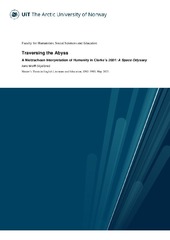| dc.contributor.advisor | Emelie Jonsson | |
| dc.contributor.author | Wolff-Skjelbred, Jens | |
| dc.date.accessioned | 2025-06-27T02:59:06Z | |
| dc.date.available | 2025-06-27T02:59:06Z | |
| dc.date.issued | 2025 | |
| dc.description.abstract | This thesis provides a Nietzchean interpretation of how humanity is portrayed in Arthur C. Clarke’s novel 2001: A Space Odyssey. This is done through drawing on theories of truth, humanity and the Other, and the Burkean sublime, as well as Nietzsche’s Thus Spoke Zarathustra, and, through this, provides an analysis of how the characters Moon-Watcher and David Bowman/the Star-Child can be understood as Nietzschean Übermensch and the subsequent consequences this has for the portrayal and understandings of humanity in the novel. Through this interpretation it is shown that humanity is both acknowledged in its sublime potential as well as criticized for not striving for said potential. | |
| dc.description.abstract | | |
| dc.identifier.uri | https://hdl.handle.net/10037/37347 | |
| dc.identifier | no.uit:wiseflow:7267842:64444314 | |
| dc.language.iso | eng | |
| dc.publisher | UiT The Arctic University of Norway | |
| dc.rights.holder | Copyright 2025 The Author(s) | |
| dc.rights.uri | https://creativecommons.org/licenses/by/4.0 | en_US |
| dc.rights | Attribution 4.0 International (CC BY 4.0) | en_US |
| dc.title | Traversing the Abyss : A Nietzschean Interpretation of Humanity in Clarke's 2001: A Space Odyssey | |
| dc.type | Master thesis | |


 English
English norsk
norsk
